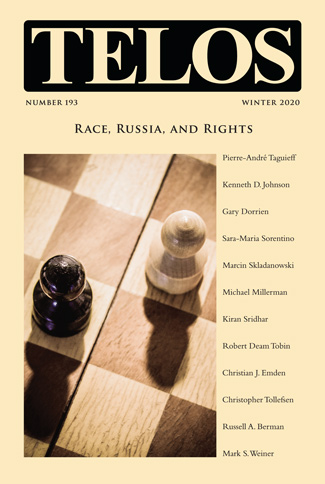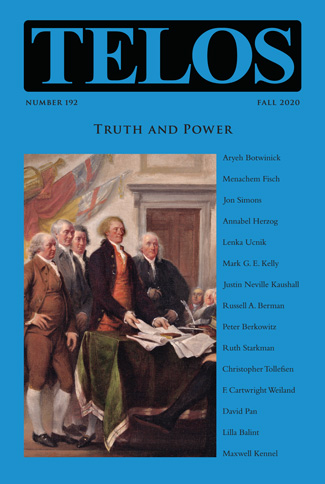In today’s episode of the Telos Press Podcast, Camelia Raghinaru talks with David Pan about his article “Unalienable Rights, the 1619 Project, and Nation-State Sovereignty,” one of a group of essays from Telos 192 (Fall 2020) on the U.S. State Department’s Commission on Unalienable Rights. An excerpt of the article appears here. If your university has an online subscription to Telos, you can read the full article at the Telos Online website. For non-subscribers, learn how your university can begin a subscription to Telos at our library recommendation page. Purchase a print copy of Telos 192 in our online store.
|
In today’s episode of the Telos Press Podcast, Camelia Raghinaru talks with Christopher Tollefsen about his article “Some Further Thoughts on the Nature, Scope, and Source of Human Rights,” one of a group of essays from Telos 192 (Fall 2020) on the U.S. State Department’s Commission on Unalienable Rights. An excerpt of the article appears here. If your university has an online subscription to Telos, you can read the full article at the Telos Online website. For non-subscribers, learn how your university can begin a subscription to Telos at our library recommendation page. Purchase a print copy of Telos 192 in our online store. In today’s episode of the Telos Press Podcast, Camelia Raghinaru talks with Takahiro Nakajima about his article “Constitutionalism and Sovereignty: On Constitutional Problems in Japan,” from Telos 189 (Winter 2019). An excerpt of the article appears here. If your university has an online subscription to Telos, you can read the full article at the Telos Online website. For non-subscribers, learn how your university can begin a subscription to Telos at our library recommendation page. Purchase a print copy of Telos 189 in our online store. Telos 193 (Winter 2020): Race, Russia, and Rights is now available for purchase in our store. Individual subscriptions to Telos are also available in both print and online formats.
Elham Manea teaches Political Science at the University of Zurich. Her forthcoming book The Perils of Nonviolent Islamism will be published by Telos Press in the spring and can be pre-ordered today in our store. The following talk was delivered as a keynote speech in German at the Convention of the Schader Foundation in Darmstadt (online) on November 6, 2020. It is becoming difficult lately to turn on the news. And I do not just mean the American presidential elections. The year 2020 was and still is a hard one. COVID-19 has dominated our lives with its limitations. But it has also welded people together in every corner of the world in the fight against a persistent and ultimately deadly virus. This struggle, this common challenge, has united us and yet divided us. We are still irritated by the lockdowns, afraid of their economic repercussions, and divided in our ideological fronts. Times like these are worrying and provide fertile ground for conspiracy theorists and right-wing and left-wing extremist groups. In times like these, our societies can all too easily become polarized, and we run the risk of being trapped in a discourse of division, trapped in identity boxes. “Us” versus “Them.” Telos 192 (Fall 2020): Truth and Power is now available for purchase in our store. Individual subscriptions to Telos are also available in both print and online formats.
First, there are natural scientific truths that even autocrats and totalitarians do not seek to deny, as they are the source of the technological tools that can support any attempt to maintain power. Here, there is certainly no conflict between truth and power. Not only does political power depend on technological achievement, but natural scientific facts cannot be covered up by lies and ideology for long. Consequently, political actors must pay attention to natural scientific and technical knowledge, even if they then instrumentalize it in different ways. |
||||
|
Telos Press Publishing · PO Box 811 · Candor, NY 13743 · Phone: 212-228-6479 Privacy Policy · Data Protection Copyright © 2025 Telos Press Publishing · All Rights Reserved |
||||




